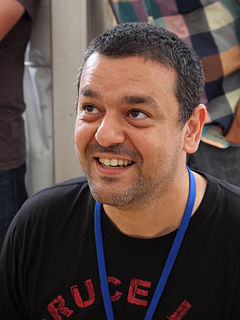A Quote by Roald Dahl
When you're writing a book, it's rather like going on a very long walk, across valleys and mountains and things [...] The highest mountain on the walk is obviously the end of the book, because it's got to be the best view of all, when everything comes together and you can look back and see that everything you've done all ties up. But it's a very, very long, slow process.
Related Quotes
I would change very little because I have been very, very fortunate. A lot of things fell into place for me simply by happenstance. When that happens you don't really want to change anything, even if you could. Editorially my regrets are few and for the most part minor. I look back on my first published book and think I held on to it too long, babied it too long.
Movies are definitely more fun because there are so many different seasons in a movie. It is exciting to be drafting together. Writing a book is very hard, it's like writing 15 college term papers in a row, and you are just like, "when is going to end?" You can communicate so much more when you are writing a book, and you can go so much deeper.
I've always believed comics should bring in things like that, and they haven't for a very long time, in general. You always get people complaining, "What's it going to look like in 10 years' time?" It's ridiculous. Everything is going to age. If you try and avoid dating it, you just end up with something that doesn't mean anything.
Preparing the animation is close to the comic book process but there are plenty of problems. It's very interesting, but it's also sometimes a pain in the arse, especially because it's so very long. Something that takes 10 minutes in comic book form can take 10 months in film form. But I love the results.
There's a great temptation to throw things in, as you put it, that you think are neat, or that you have a very clear, specific memory of and think you could do a good job writing about. What I find is that it's like a seed you plant. You can try it, and if it will grow and connect with other ideas in the book, and you can see connections that you can actually realize on the page, then you're allowed to leave it in. But if it just kind of lies there and doesn't really add up to anything or there's no chemistry with everything else going on in the book, then you have to take it out.
Some beings will walk with you for the duration of this bodily existence, up to the very end. Some will come with bright promises, bright lights, but they fade quickly. Others come, they don’t look like they will go very far, but they are marathon runners; they’re there with you all the time. You cannot determine this... Somehow in the flow of your own unique river, you will see that everything is as it should be.
Burroughs called his greatest novel 'Naked Lunch,' by which he meant it's what you see on the end of a fork. Telling the truth. It's very difficult to do that in fiction because the whole process of writing fiction is a process of sidestepping the truth. I think he got very close to it, in his way, and I hope I've done the same in mine.
Long ago, when I was a very young girl, I said that I wanted to go everywhere, see everything, taste everything. hear everything, touch everything, try everything before I died. There isn't anything you can name that a woman can do that I haven't done. I don't intend to stand by and be a spectator. I want to be right in there in the midst of it, right up to my nose - totally involved in the community, in the world, in the stream of history, in the human image.
I can walk into a bookshop and point out a number of books that I find very unattractive in what they say. But it doesn't occur to me to burn the bookshop down. If you don't like a book, read another book. If you start reading a book and you decide you don't like it, nobody is telling you to finish it.






































